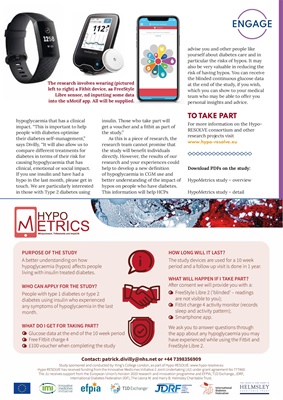
19
ENGAGE
hypoglycaemia that has a clinical
impact. "This is important to help
people with diabetes optimise
their diabetes self-management,"
says Divilly, "It will also allow us to
compare different treatments for
diabetes in terms of their risk for
causing hypoglycaemia that has
clinical, emotional or social impact.
If you use insulin and have had a
hypo in the last month, please get in
touch. We are particularly interested
in those with Type 2 diabetes using
Download PDFs:
HypoMetrics study - overview
HypoMetrics study - detail
PURPOSE OF THE STUDY
A better understanding on how
hypoglycaemia (hypos) affects people
living with insulin treated diabetes.
WHO CAN APPLY FOR THE STUDY?
People with type 1 diabetes or type 2
diabetes using insulin who experienced
any symptoms of hypoglycaemia in the last
month.
HOW LONG WILL IT LAST?
The study devices are used for a 10 week
period and a follow up visit is done in 1 year.
Contact: patrick.divilly@nhs.net or +44 7398356909
Study sponsored and conducted by: King's College London, as part of Hypo-RESOLVE: www.hypo-resolve.eu
Hypo-RESOLVE has received funding from the Innovative Medicines Initiative 2 Joint Undertaking (JU) under grant agreement No 777460.
The JU receives support from the European Union's Horizon 2020 research and innovation programme and EFPIA, T1D Exchange, JDRF,
International Diabetes Federation (IDF), The Leona M. and Harry B. Helmsley Charitable Trust.
WHAT DO I GET FOR TAKING PART?
Glucose data at the end of the 10 week period
Free Fitbit charge 4
£100 voucher when completing the study
WHAT WILL HAPPEN IF I TAKE PART?
After consent we will provide you with a:
FreeStyle Libre 2 ('blinded' - readings
are not visible to you);
Fitbit charge 4 activity monitor (records
sleep and activity pattern);
Smartphone app.
We ask you to answer questions through
the app about any hypoglycaemia you may
have experienced while using the Fitbit and
FreeStyle Libre 2.
insulin. Those who take part will
get a voucher and a fitbit as part of
the study."
As this is a piece of research, the
research team cannot promise that
the study will benefit individuals
directly. However, the results of our
research and your experiences could
help to develop a new definition
of hypoglycaemia in CGM use and
better understanding of the impact of
hypos on people who have diabetes.
This information will help HCPs
advise you and other people like
yourself about diabetes care and in
particular the risks of hypos. It may
also be very valuable in reducing the
risk of having hypos. You can receive
the blinded continuous glucose data
at the end of the study, if you wish,
which you can show to your medical
team who may be able to offer you
personal insights and advice.
TO TAKE PART
For more information on the HypoREOLVE
consortium and other
research projects visit
www.hypo-resolve.eu
The research involves wearing (pictured
left to right) a Fitbit device, aa FreeStyle
Libre sensor, nd inputting some data
into the uMotif app. All will be supplied.